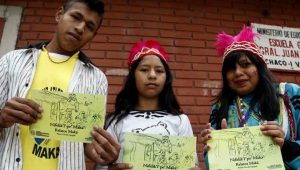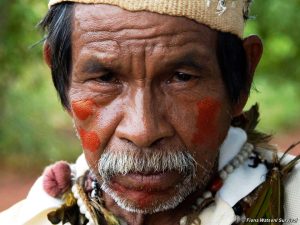Hello I am Fred. I am a second-year student here with an undecided major of some combination of history and political science. I’m from West Virginia and I enjoy seeing new places. A few summers ago I traveled to Ecuador and the Amazon rainforest and was exposed to the intriguing Latin American culture in the flesh. In this class I hope to expand on my understanding of this culture through the study of the continents history as a whole. I am most excited to learn about the dynamic clashes and interactions between European explorers with the native peoples.
Introduction
Hi! My name is Kate Atwell. I am Sophomore from Seattle Washington. I plan on majoring in either Anthropology or Sociology, with a minor in Spanish. At the college, I am a tour guide, part of the Woo Sang a cappella group, a member of Delta Theta Psi, and I recently joined the blue grass group on campus. Fun fact, I also made my own album of original songs this summer, and am hoping to perform my music around the Wooster community this year.
I enrolled in this class partially because it was recommended to me by a history major, but also based off my own personal desire to understand more about the roots of the America’s as whole. In my high school Spanish class, we learned a lot of 20th century Latin American history. I was honestly a little overwhelmed about all the information, and feel that it might make more sense if I could start from the roots of the history and culture. Additionally, I am considering studying abroad preferably in Argentina next year, and feel that having a little historical background would not be a bad thing.
Introduction
Hello! My name is Alberto Peralta and I am a second-year. I was born in Guanajuato, Mexico, but I grew up in Atlanta, GA. Currently I am undecided on my major. I would have liked to major in Latin American studies here at the college, but Latin American studies are only offered as a minor. I am going to decide this semester between political science or history as potential majors. I am involved around campus as a member of club soccer, alumni liaison for the Men of Haramabee, and I am co-president of the First Generation Student Organization here at Wooster.
This semester I am interested in learning more about the pre-Columbian Americas because although I feel I have a good grasp on contemporary Latin America, I am not as strong in colonial Latin America. I don’t just want to learn more about the governing systems of the Americas, I want to know how these systems of government transcended into what Latin America is today. I also want to learn more about my history. For a long time through out high school, we were taught various misconceptions about the people of Latin America.
Latin American History and Culture Blog Post – Guarani Language Day in Paraguay
The Guarani Language Day celebrates the diversity and the culture of the Guarani in Paraguay. Now, in it’s fourth year, the Paraguayan government uses this day to promote the language in schools, government, and everyday aspects of Paraguayan life. Written by TeleSUR, a Latin American news network, this network places indigenous Latin Americans as the central point of this article. Unlike other articles, this article places the Guarani as hardworking humble people. It portrays them as victims of mistreatment by the government as well. This holiday is celebrated yearly on August 25.

GUARANI STUDENTS HOLD UP THEIR SCHOOL WORK THAT IS WRITTEN IN GUARANI. IN 2010, GUARANI WAS ADDED AS ANOTHER OFFICIAL LANGUAGE FOR THE COUNTRY OF PARAGUAY.
The Guarani share a common struggle with other native Latin American groups in Latin America. They fight to preserve not only their culture, but they also fight to literally stay alive. Recently, a lot of land has been expropriated for the Guarani and other indigenous groups of Latin America. Recently, the Paraguayan government has increased it’s legal protection for the Guarani and other indigenous groups after international scrutiny. Guarani has become an official language also taught in most schools. According to TeleSur, 90% of all adults can speak Guarani.
This article reflects a lot of class themes we will be covering. One central theme is the coexistence between European Americans and native people of the Americas. This is an example of a culture, people, and language that survived despite conquest and subjugation by colonizers. For our class, I think it is important to commemorate events such as these that celebrate a culture and people who are still here today. I think as historians, it is our duty to acknowledge and support events that preserve pre-Columbian Latin American culture and people.

Class Introdction
Hello! I’m Catalina. I’m a chican@ from Atlanta, Georgia. I am a first year Posse Scholar. My first language is Spanish with English following close behind. I have two elder sister and two elder brothers. My family has two dogs, two birds, a rabbit, and I have a cat, Bumblebee, that I love and miss so much. I’m so excited to finally being able to learn about topics that I am actually interested in!
I’m taking Colonia History because I was never able to learn in depth about Pre-Colombian Latin America and only a Euro-centric whitewashed version of Latin American history. This is my culture that I am going to be learning about and I could not be more ecstatic. I will finally be able to have knowledge about my history and have a better connection with my roots.
Quick intro
Hi everyone! My name is Trevin and I am a Junior Archaeology major from Chicago, Illinois. I am most active in the Catholic Newman Group, but also participate in the fencing and chess clubs. While my major is Archaeology, I am also passionate about History, especially the Classics, and hope to one day go on an archaeological excavation on an ancient Roman site.
In Colonial Latin America, I would most like to learn about the Spanish and Portuguese administrations in the Americas. How were they able to control such a vast area so far from their homelands for hundreds of years? What degree of autonomy was granted to local administrations? Was European dominance total, or were the natives and colonists never fully pacified? I hope to find answers to these questions and others through this course.
